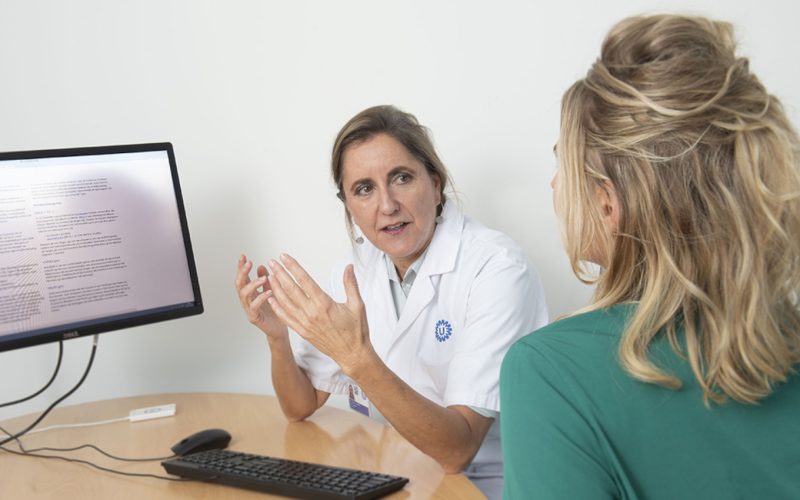Physicians and nurse specialists in breast cancer care can more effectively offer DNA testing themselves, rather than referring their patients to a clinical geneticist. This has been shown by research from UMC Utrecht, in collaboration with the Netherlands Comprehensive Cancer Organisation (IKNL), University of Twente and Erasmus MC. The so-called mainstreaming approach improves access to genetic care, especially for people with a lower socioeconomic position. By detecting hereditary breast cancer more effectively, mainstreaming has a positive impact on care and treatment for patients and their families, says clinical geneticist and lead researcher Margreet Ausems. “This approach really enables us to improve care.”
Genetic testing for breast cancer is essential to offer to eligible patients, according to guidelines. For patients with breast cancer, genetic testing can provide information to guide treatment choices. Moreover, if such a test reveals a hereditary predisposition for breast cancer, family members are eligible for genetic testing. They can then take measures to detect cancer at an earlier stage or even prevent it.
Patients are often referred to a clinical geneticist at another hospital for genetic testing after diagnosis. Physicians and nurse specialists in breast cancer care can more effectively offer DNA testing themselves, rather than referring their patients to a clinical geneticist. This referral raises the threshold for many people. As a result, they, and possibly their family members, miss out on essential care.
Genetic testing can also be discussed and requested by other healthcare professionals. In this so-called “mainstreaming”, surgeons, oncologists or nurse specialists conduct the initial consultation with their own patient. They then request the genetic testing themselves. This approach enables more people to actually receive the DNA testing they are eligible for. Researchers, led by Margreet Ausems, clinical geneticist and professor of Clinical Oncogenetics at UMC Utrecht, studied how effective mainstreaming is in offering genetic testing to people with breast cancer.
For their study, the researchers used data from the Dutch Cancer Registry (Nederlandse Kankerregistratie, NKR). “This contains all relevant data, such as age, gender, the type of breast cancer, and whether someone has previously undergone genetic testing,” says Chiem de Jong, PhD candidate and co-researcher. “Using this information, we examined whether all patients with breast cancer who were eligible for genetic testing actually received it, and whether this was related to the way genetic care is organized in the Netherlands.”
From 2017 through 2022, the NKR recorded more than 110,000 patients with breast cancer. Of these, over 12,000 were eligible for genetic testing based on NKR data. People receiving care at a mainstreaming hospital were more likely to undergo genetic testing. In these hospitals, 78 percent of eligible patients received testing. In hospitals where patients were referred to clinical genetics for DNA testing, this was only 63 percent.
“By detecting hereditary breast cancer more effectively, mainstreaming has a positive impact on care and treatment for patients and their families”
In addition, socioeconomic status plays a role in the likelihood of receiving genetic testing. People with a lower socioeconomic status were less likely to receive genetic testing after a breast cancer diagnosis than those higher up the social ladder – if they were treated in a hospital where patients were referred to a clinical geneticist. At hospitals that had implemented the mainstreaming approach, this difference was not present.
“With this study, we show that mainstreaming is the way to offer genetic testing to every breast cancer patient who is eligible,” Ausems said. “This approach makes care more accessible, especially for people with a lower socioeconomic status. The hospital where you are treated, your income or your education level should not affect your chances of receiving genetic testing.”
Ausems hopes that the recently published research will make healthcare professionals realise that mainstreaming is a logical choice when offering genetic testing to people with breast cancer. “There is such a big difference in the number of genetic tests performed in hospitals that do and don’t apply mainstreaming. This has never been shown this clearly before.” The researchers are currently further developing an online training for healthcare professionals on mainstreaming and health disparities in breast cancer. The training will be available after the summer, possibly in combination with an on-site session.
Everyone with breast cancer who qualifies for genetic testing should be able to receive it, says Ausems. “That way, not only do patients receive optimal treatment, but their family members can also benefit if there’s a hereditary predisposition. How nice is it to have this test done after a short consultation, right in your own hospital? If we don’t start working this way, we are truly doing some patients a disservice.”
The GENE-SMART study is a collaboration between researchers from UMC Utrecht (Margreet Ausems, Chiem de Jong), the Netherlands Comprehensive Cancer Organisation / University of Twente (Sabine Siesling), and Erasmus MC (Agnes Jager). The results of the study were recently published in the scientific journal Breast Cancer Research.
